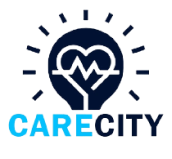FUTURE OF HEALTHCARE: THE DIGITAL PERSPECTIVE
By
Adewumi Oluwatobi (RN, DHA)
Chief Operations Officer, Carecode
The Covid-19 pandemic has proved to us beyond a reasonable doubt that being rigid to evolving technology will cause more harm than good.
Wearing masks and social distancing are crucial but these technological strategies are not entirely new; similar approaches were used during the 1918 flu pandemic.
Artificial intelligence for Data Mining, Remote Surveillance of patients on a ventilator, Rapid Testing, UVC light for SARS COV 2 Inactivation are enough instances to show how technology has assisted the Healthcare industry in combating the pandemic.
This article is not focused on Covid – 19 tech interventions, rather it discusses healthcare in its entirety. We will consider how evolving technologies will influence Healthcare delivery in the coming years.
It’s interesting that Doctors, Nurses, and other Healthcare Professionals now think robots/automation will take over their jobs as we see in some other industrial sectors (engineering).
We live with the fear that Artificial Intelligence, Virtual, and Augmented reality will control the world in the not too distant future.
These ideas are all just imaginary dystopias. In other words, they are contradictory opinions about the future of Healthcare.
No matter what opinion we have, we cannot stop technological advancement, and sooner we’ll discover that a larger part of our existence as a species has been greatly influenced by Digital Technologies.
Rather than being dysphoric about the technological disruption and remaining rigid to the accompanying changes, we should be open-minded and prepare for the digital evolution with as much enthusiasm as possible.
Let’s briefly consider a few of the rapidly evolving Digital Technologies and their influence on Healthcare.
1. ARTIFICIAL INTELLIGENCE
Artificial intelligence has the potential to redesign healthcare completely. AI algorithms can mine medical records, design treatment plans, or create/design drugs faster & more efficiently as compared to traditional methods of drug development/production.
Recently, Google’s DeepMind created an A.I algorithm for breast cancer analysis. The algorithm outperformed all human radiologists on pre-selected data sets to identify breast cancer, on average by 11.5%.
This is just one out of many other examples of how AI is drastically influencing the way we operate in the healthcare industry.
2. HEALTHCARE TRACKERS AND WEARABLE DEVICES
As the future of healthcare is tending towards the empowerment of patients as well as individuals taking care of their health through technologies, the usage, and benefits of health trackers, wearables and sensors cannot be overemphasized.
These smart devices help us to understand better how our bodies work, by extracting useful physiological data from our bodies, analysing & interpreting them for us and a team of healthcare professionals, with the help of cloud technology.
Whether you would like to watch your weight, observe your stress level, monitor your cognitive capabilities better or you would like to reach an overall fit and energetic state, there is a device for all of these needs and even more!
The beauty of these new tech-driven devices is that they make patients the point-of-care. Having the ability to monitor one’s health at home and share the results remotely with the healthcare team; these devices empower people to take control of their health and make more informed decisions.
There are various examples of wearables, trackers that perform different functions.
3. ROBOTICS
Healthcare Robotics is one of the fastest-growing fields of healthcare technologies; developments range from robot companions through to surgical robots to ‘pharmabotics,’ disinfectant robots, or exoskeletons.
2019 was a great year for exoskeletons. It saw Europe’s first exoskeleton-aided surgery and a tetraplegic man capable of controlling an exoskeleton with his brain!
Also during the pandemic, robots were used to limit human contact with infected individuals in the isolation centers. They performed functions such as disinfection of rooms, food delivery and a lot more.
The Jibo, Pepper, Paro, and Buddy robots are all existing examples. Some of them even have touch sensors, cameras, and microphones for their owners to interact with them.
4. NANOMEDICINE
Nanotechnology is also contributing significantly to medical practice and Healthcare delivery. It is making progress in the form of smart patches. At CES 2020, France-based company Grapheal demonstrated its smart patch that allows continuous monitoring of wounds and its graphene core can even stimulate wound healing.
As the technology evolves, we will see more practical examples of nanotechnology in medicine such as cancer treatment, precise drug delivery system, and so on.
5. IN SILICO DRUG TRIALS
These are individualized computer simulations used in the development or regulatory evaluation of a medical product, device, or intervention.
While the current technology and biological understanding don’t allow for completely simulated clinical trials, there is significant progress in this field with organs-on-a-chip, which are already being put in use.
In Conclusion, as the reality of these developments continues to dawn on us, we should equip ourselves with adequate knowledge to eradicate all fear or misconceptions that may accompany the evolution of these technologies.
References: The Medical Futurist Newsletter, MobiDev, AIMsEdu.

Carecode in collaboration with Nursesintech are organizing a free special WEBINAR for registered nurses & healthcare professionals to celebrate the yuletide. Fill this form to register now.







Drop Your Comment